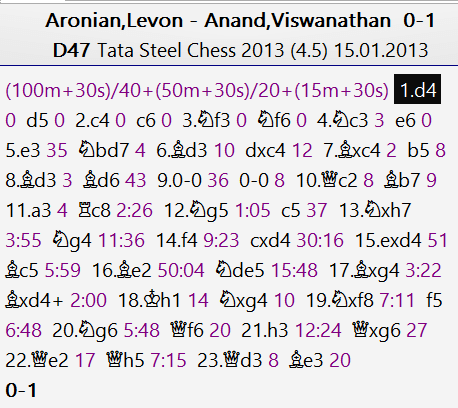Everyone who ever played a serious game of chess will acknowledge the importance clock times can have during the decision making process. A chess player running out of time may play less accurate, sometimes leading to blunders - even on the highest level. That’s why clock time information is an important part of live broadcasted games: it adds essential information to the broadcasted chess game, which increases the tension (and thus interest) to the watchers of the games.
For instance the recent played game Ivanchuk-Svidler in the 3rd round of the London Candidates: Ivanchuk ran out of time at an early stage in the game and although his position wasn't lost, he eventually lost on time. Who would recall these circumstances when reenact the game from a database that doesn’t provide clock time information? Technically it should be possible: live games are saved into a PGN-file including clock time information. However, once the games are stored in the database, the clock time information is lost. I hope this letter will encourages the chess world to store and publish clock time information in the PGN notation.
The idea to save clock time information in a PGN-file is not new: Back in 2001, some leading companies agreed on a new standard for PGN files how to notate clock time information. There are several variations:
The actual clock times are written as 1. d4 {[%clk 1:59:01]} Nf6 {[%clk 1:59:32]}
The time used on a move are written as 1. d4 {[%emt 0:0:59]} Nf6 {[% emt 0:0:28]} – note that the %emt-tag needs to be accompanied by the time control.
However, almost no game is stored this way in the database. It took almost 10 years before DGTs software for broadcasting live games started to save clock time information in a live-PGN with the %clk-tag.
It is a next step forward. We need to collect PGNs which includes time information, store them in database and display them in a chess game viewer.
However, have you ever seen a (non-live) game viewer or database program that uses time information? I haven't! That’s why I configured one myself as an example with Paolo Casaschi's PGN4web-viewer, using the %clk-tag.
Unfortunately, world-leading database program Chessbase doesn't have an option to show the clock times. Even more remarkable: after storing a live-PGN in Chessbase, the program automatically removes all clock information.
The reason for that is quite technical: Chessbase converts the %clk-tag (written in the live-PGN) to the %emt-tag – and this only works if also the time control is added to the PGN-file. This is where the problem starts: DGT doesn't write the time control in the PGN-files of their live games. As a result, all clock time information is lost in conversion.

Clock time information (%emt) in Chessbase 12 after a correct conversion. Note there is no clock function in Chessbase to display the clock time.
Recently, during the first round of the London Candidate, the discussion about clock time information became actual again: AGONs ChessCasting website prominently shows the clock time information during the game. But again: once the game is over the clock time information is lost.
I hope this letter will promote the saving and publishing of chess games with clock time information. In order to archive this, I would like to propose:
- Tournament organizers to publish the games in PGN format including clock time information on their website.
- DGT to add a function to their software which stores the time control in the live-PGN.
- Chessbase (and other database companies) to collect PGN-files with clock time information and to display this information with a clock function.
About the author
Lennart Ootes, 24-years-old from the Netherlands.
He contributed to many chess tournaments, like Tata Steel. He has knowledge and practical experiences with websites, video, photography and electronical chessboards broadcasting.
His goal is to move chess and chess broadcasting to a higher level.
Personal website: www.lennartootes.com
